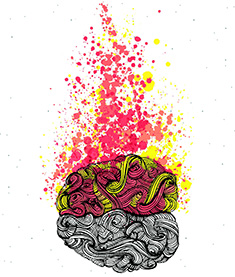PhD defence: Environmental heat stress and motor-cognitive performance
Jacob Feder Piil
PhD thesis

Introduction
As the world warms, heat waves will become longer and happen more often. This is concerning for manual laborers because during heat waves, work performance gets worse and more work-site accidents happen. Although these real-world findings are well-documented, results from laboratory studies have been inconsistent, with multiple reports showing that heat improves, worsens, or has no effect on cognitive performance.
These inconsistent findings are likely due to the variable study protocols, the lack of familiarization to these protocols, and the lack of other potential compounding variables during testing. Therefore, the present thesis first aimed to develop a new cognitive testing method, which could detect reductions in cognitive-motor ability caused by heat stress. Next, this method was used to test whether dehydration and solar radiation worsened, or if heat acclimation protected against, the reductions in motor-cognitive performance caused by the heat.
Methods
Applying the new assessment method, the effects of: 1) moderate [1°C] and severe [≥2°C] changes in core temperature alone or combined with, 2) dehydration levels of 2% body mass loss, or 3) solar radiation applied to the head, and 4) moderate (14 days) and prolonged (28 days) heat acclimation, were explored.
Results
Moderate increases in core temperature in hot-dry environments do not impair motor-cognitive performance, however, severe increases in core temperature reduced motor-cognitive performance by a lot. Further, motor-cognition was much worse when the participants were dehydrated. Direct solar radiation exposure of the head, combined with moderate increases in core temperature, caused reductions in motor-cognition that were as bad as the reductions caused by severe changes in core temperature without solar radiation. Finally, heat acclimation did not protect against the reductions in cognitive performance caused by heat stress.
Conclusions
The new testing method was both sensitive and reliable enough to detect reductions in motor-cognition caused by heat stress and that dehydration and solar-radiation make the reductions in motor-cognition worse, but that heat acclimation does not protect against these reductions.
Together, these findings help to explain why real-world and laboratory-based studies are in disagreement concerning whether heat affects cognitive performance and identify other environmental and internal risks to address in order to protect worker wellbeing.
2020, 138 pages.
Time
15 April 2020, 14:00
Place
Digital defence.
Opponents
Professor Bente Kiens (chair), University of Copenhagen, Department of Nutrition, Exercise and Sports, Denmark.
Research Associate Professor Jason Lee Kai Wei National University Singapore, Singapore.
Professor Craig Crandall Texas Health Presbyterian Hospital Dallas, USA.
Supervisor
Professor Lars Nybo, Department of Nutrition, Exercise and Sports, University of Copenhagen, Denmark.
